External links
| | This article about a sports television series is a stub. You can help Wikipedia by expanding it. |
| | This article relating to a non-fiction television series in the United States is a stub. You can help Wikipedia by expanding it. |
The College Football All-Star Challenge is a made-for-television competition that is shown on ESPN. The event, produced by Chicago-based Intersport, features senior-class college football players competing in a number of skills contests, including throwing for distance, throwing for accuracy, shuttle runs, and powerlifting.
The Challenge was televised by Fox from its beginning in 1999 until 2005. ESPN began its telecasts in 2006. During the years Fox showed the Challenge, it was held at the same site as that year's Super Bowl. The ESPN events have been televised from the Orange Bowl Stadium in Miami, Florida (coincidentally, the home area of Super Bowl XLI, although at a different location, Dolphin Stadium). In 2009 however, when Super Bowl XLIII was held at Raymond James Stadium in Tampa, Florida, the event was televised from Pepin/Rood Stadium at the University of Tampa.
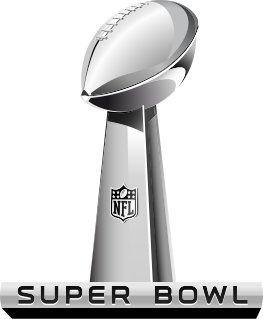
The Super Bowl is the annual playoff championship game of the National Football League (NFL). It has served as the final game of every NFL season since 1966, replacing the NFL Championship Game. Since 2022, the game is played on the second Sunday in February. Prior Super Bowls were played on Sundays in early to mid-January from 1967 to 1978, late January from 1979 to 2003, and the first Sunday of February from 2004 to 2021. Winning teams are awarded the Vince Lombardi Trophy, named after the coach who won the first two Super Bowls. Due to the NFL restricting use of its "Super Bowl" trademark, it is frequently referred to as the "big game" or other generic terms by non-sponsoring corporations. The day the game is played is often referred to as "Super Bowl Sunday" or simply "Super Sunday".

The Tampa Bay Buccaneers are a professional American football team based in Tampa, Florida. The Buccaneers compete in the National Football League (NFL) as a member club of the league's National Football Conference (NFC) South division. The club joined the NFL in 1976 as an expansion team, along with the Seattle Seahawks, and played its first season in the American Football Conference (AFC) West division. Prior to the 1977 season, Tampa Bay switched conferences and divisions with Seattle, becoming a member of the NFC Central division. As a result of the league's realignment prior to the 2002 season, the Buccaneers joined three former NFC West teams to form the NFC South. The club is owned by the Glazer family and plays its home games at Raymond James Stadium in Tampa.
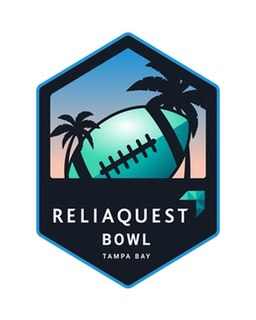
The ReliaQuest Bowl is an annual college football bowl game played at Raymond James Stadium in Tampa, Florida, usually on New Year's Day. The event has been formerly called the Hall of Fame Bowl from 1986 to 1995 and the Outback Bowl from 1996 to 2022. It is organized by the Tampa Bay Bowl Association under Jim McVay, who has been the president and CEO since 1988.

Tampa Stadium was a large open-air stadium located in Tampa, Florida, which opened in 1967 and was significantly expanded in 1974–75. The facility is most closely associated with the Tampa Bay Buccaneers of the National Football League, who played there from their establishment in 1976 until 1997. It also hosted two Super Bowls, in 1984 and 1991, as well as the 1984 USFL Championship Game.
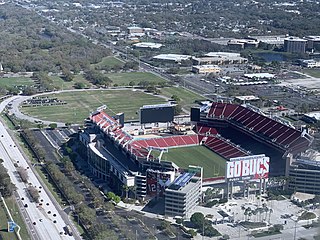
Raymond James Stadium is a multi-purpose stadium in Tampa, Florida that opened in 1998 and is home to the Tampa Bay Buccaneers of the National Football League (NFL) and the University of South Florida (USF) Bulls college football program. The seating capacity for most sporting events is 65,618, though it can be expanded to about 75,000 for special events with the addition of temporary seating. Raymond James Stadium was built at public expense as a replacement for Tampa Stadium and is known for the replica pirate ship located behind the seating area in the north end zone. Raymond James Financial, a financial service firm headquartered in the Tampa Bay area, has held the naming rights for the stadium for the stadium's entire existence.
College football on television includes the broad- and cablecasting of college football games, as well as pre- and post-game reports, analysis, and human-interest stories. Within the United States, the college version of American football annually garners high television ratings.
The National Football League Kickoff game, along with related festivities, marks the official start of the National Football League (NFL) regular season. A single game is held, preceded by a concert and other ceremonies. This first game of the season is usually scheduled for the Thursday following Labor Day and since 2004, it has been hosted by the current Super Bowl champions. However, in 2012, the game was moved to Wednesday to prevent conflicts with the acceptance speech of the Democratic National Convention. The remainder of the league plays their opening weekend games the following Sunday and Monday.
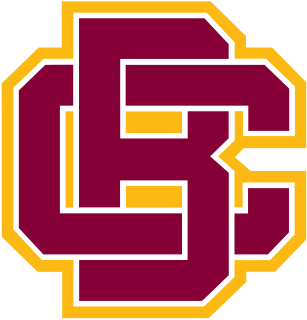
The Florida Classic is the annual college football rivalry game between Bethune–Cookman University and Florida A&M University. The game has been televised nationally by ESPN Classic as a part of a multi-year contract with the Mid-Eastern Athletic Conference (MEAC), which had been both schools' home conference until their July 2021 departure for the Southwestern Athletic Conference (SWAC). The game is operated by Florida Citrus Sports, a non-profit group that also organizes the Cheez-It Bowl and Citrus Bowl. The Classic has approximately a $31 million impact on Orlando's economy; it was the largest MEAC conference football game before the schools left for the SWAC, and remains the largest Division I FCS football game in Florida.

The Tampa Bay area is home to many sports teams and has a substantial history of sporting activity. Most of the region's professional sports franchises use the name "Tampa Bay", which is the name of a body of water, not of any city. This is to emphasize that they represent the wider metropolitan area and not a particular municipality and was a tradition started by Tampa's first major sports team, the original Tampa Bay Rowdies, when they were founded in 1975.
The Under Armour High School All-America Game is a high school football all-star game typically held in early January in the U.S. state of Florida created to spotlight the nation’s top high school seniors. The game was first played on January 5, 2008, and has been played annually at Tropicana Field in St. Petersburg, Florida or at Camping World Stadium in Orlando, Florida. The game is sponsored by Under Armour and enjoys a national audience thanks to broadcast partner ESPN. The game is co-owned by Chicago-based sports marketing agency Intersport and ESPN.
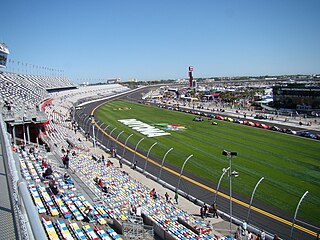
The U.S. state of Florida has three National Football League teams, two Major League Baseball teams, two National Basketball Association teams, two National Hockey League teams, two Major League Soccer teams and 13 NCAA Division I college teams.
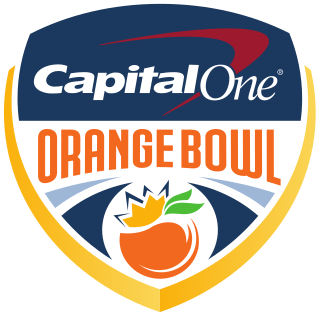
The Orange Bowl is an annual American college football bowl game played in the Miami metropolitan area. It has been played annually since January 1, 1935, making it, along with the Sugar Bowl and the Sun Bowl, the second-oldest bowl game in the country, behind the Rose Bowl. The Orange Bowl is one of the New Year's Six, the top bowl games for the NCAA Division I Football Bowl Subdivision.

The College Football Playoff National Championship is a post-season college football bowl game, used to determine a national champion of the NCAA Division I Football Bowl Subdivision (FBS), which began play in the 2014 college football season. The game serves as the final of the College Football Playoff, a bracket tournament between the top four teams in the country as determined by a selection committee, which was established as a successor to the Bowl Championship Series and its similar BCS National Championship Game.

Super Bowl LIV was an American football game played to determine the champion of the National Football League (NFL) for the 2019 season. The American Football Conference (AFC) champion Kansas City Chiefs defeated the National Football Conference (NFC) champion San Francisco 49ers, 31–20. The game was played on February 2, 2020, at Hard Rock Stadium in Miami Gardens, Florida. This was the eleventh Super Bowl hosted by the South Florida region and the sixth Super Bowl hosted in Miami Gardens, which hosted Super Bowl XLIV ten years earlier.

Super Bowl LV was an American football game played to determine the champion of the National Football League (NFL) for the 2020 season. The National Football Conference (NFC) champion Tampa Bay Buccaneers defeated the American Football Conference (AFC) champion Kansas City Chiefs, 31–9. The game was played on February 7, 2021, at Raymond James Stadium in Tampa, Florida, the home stadium of the Buccaneers, marking the first time a team played a Super Bowl in its home stadium. Due to COVID-19 protocols limiting the stadium's seating capacity to 25,000 fans, it was the least-attended Super Bowl.

Super Bowl LVII is the upcoming championship game of the National Football League (NFL) for the 2022 NFL season. The game is scheduled to be played on February 12, 2023, at State Farm Stadium in Glendale, Arizona. It will be the fourth Super Bowl hosted by the Phoenix metropolitan area, with the most recent being Super Bowl XLIX in 2015, also held at State Farm Stadium. The game will be televised nationally by Fox.
On March 12, 1990, at the NFL's annual meeting in Orlando, Florida, the league new ratified four-year television agreements for the 1990 to 1993 seasons involving ABC, CBS, NBC, ESPN and TNT. The contracts totaled US$3.6 billion, the largest package in television history. This contract saw each network having rights to one Super Bowl telecast as part of the package. The fourth Super Bowl (XXVIII) was up for a separate sealed bid. NBC won the bid, and since they were last in the rotation for Super Bowl coverage in the regular contract, ended up with two straight Super Bowls. CBS is the only other network to televise two Super Bowls in a row. NBC, which had held XXVII, was the only network to bid on XXVIII. Previously, the league alternated the Super Bowl broadcast among its broadcast network partners, except for Super Bowl I; CBS broadcast Super Bowl II, then the league rotated the broadcast between CBS and NBC until 1985 when ABC entered the rotation when that network broadcast Super Bowl XIX.
Initial college football broadcasts on the Fox network were limited to selected bowl games, beginning with the Cotton Bowl Classic from 1999 to 2014. From 2006 to 2009, Fox broadcast the Bowl Championship Series. Fox also holds rights to the Redbox Bowl and Holiday Bowl.
ABC has been airing college football since acquiring the NCAA contract in 1966. Chris Schenkel and Bud Wilkinson were the number one broadcast team through 1973. Keith Jackson, its best-known college football play-by-play man, announced games from 1966 through 2005 on ABC, and was considered by many to be "the voice of college football." Jackson was ABC's lead play-by play man for 25 years, from 1974 through 1998. He originally was to retire after the 1999 Fiesta Bowl, but agreed to remain on a more restricted schedule and remained with ABC through the 2006 Rose Bowl.

When the World Health Organization declared the COVID-19 pandemic in March 2020, all major professional and collegiate organizations responded by suspending operations indefinitely. This effect was passed down to the world of sports broadcasting, which includes live coverage of thousands of events on an annual basis through stations and network available over the air, through cable, satellite, and IPTV companies, and via streaming and over-the-top services.